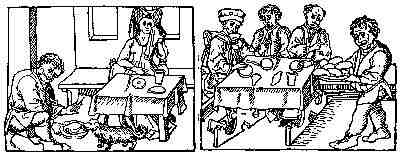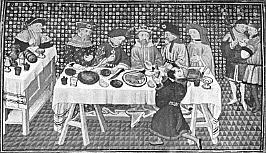Eating Habits of the TimeT he people of the middle ages not only consumed food that are very different from what we are accustomed to today, their habits of eating were also very different. Today, most individuals have three meals per day, consisting of a breakfast, a lunch and a dinner. We usually eat the three meals after awakening in the morning, midway and at night, respectively. However, initially, only two meals were eaten every day by the people of the medieval ages. Breakfast, contrary to common belief, was not eaten right after one has awakened. Instead, several tasks and chores, such as collecting the eggs from the hens, were usually performed prior to breakfast. The breakfast usually consisted of soup and grain products, but rarely contained meat. Lunch was not served during the medieval ages, as one was expected to last the entire day solely on the breakfast. At the evening, after a day of handwork, the main meal would be served. The dinner would usually consist of soup, bread, and vegetables, followed by fish or meat.
D
uring the later stages
of the medieval period, the habit of eating only two meals per day was
abandoned. Gradually, people, especially peasants, began to eat three meals
per day. Most historians believe that the change was to accommodate the
increasingly intense amount of labour required during the day. Some experts
also believe that the two meals per day habit was passed-on from the Romans,
as a result of their comfortable lifestyle. They think that due to the
large amount of slaves used, the Romans were not required to conduct intensive
physical labour. As a result, only two meals per day was necessary. However,
during the Middle Ages, the peasants did not have the luxury of slaves
to help in the farm, thus, was forced to exert more effort into the maintaining
of the farm. Quickly, people realized that an additional meal was necessary
to sustain their energy through the day, adding a meal during mid-day as
a result.
One might question that why the nobles, who were not required to conduct intensive physical labour in the farm, added a third meal to their diet also? Some historians suggest that the nobles simply chose to eat an additional meal during mid-day just as the peasants since the food was available. Others argue that despite being free of farm related labour, the nobles also lived a life that was physically demanding. They think that, for example, the amount of intense physical activities squires would need to endure, should be at least equivalent to the farming conducted by the peasants. It was said that they were required to practice the skills of combat in heavy armours for prolonged hours and overcome other tasks and challenges. Naturally, under such demanding circumstances, the nobles also added a mid-day meal to their diet.
|
|


